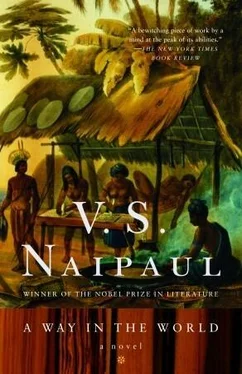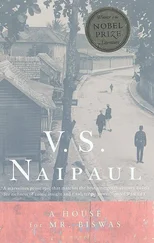He was more than ten years older than I, and in Trinidad that difference in age was important. It meant he had been born in a darker time. His education hadn’t been as straightforward as mine. He came from a poor family in a far-off country area and he had made a late start. That late start had put him at a disadvantage in the educational system. He had had to go to rough elementary schools and then to “private” high schools run by people with the barest qualifications. He would always have been too old for the better schools, and he would never have had the clear vision of a way ahead that had been given to me at an early stage: elementary school, exhibition to a secondary school, scholarship to a university abroad. He would have always had to feel his way. And when, after all of this, he had entered the government service, just before the war, his prospects were still limited; the senior posts were reserved for English people.
That had changed. He wasn’t thirty, but he was already a senior clerk, higher in the service than he could have imagined when he entered it. He intended to rise further: it was known that he was studying for an external London degree. And yet in the office I was seen as the man with the real future: Oxford, and a career in the wider world. Blair himself seemed to think so. He might have felt that in other circumstances his chances might have been more like mine, but he showed me no grudge. In Trinidad in the 1940s — before the full postwar opening up of the world for people, and while the society was still colonial — scholarship-winners received a special admiration; they were admired almost as much as cricketers. Blair offered me this admiration.
And then over the years things had evened out for us. My life abroad, so brilliant to think about in the Red House in Port of Spain, had turned out to be hard and mean. My career had taken many years to get started. I had had to learn to write from scratch, almost in the way a man has to learn to walk and use his body again after a serious operation. And even then after ten years I couldn’t feel secure, worrying always about finding matter for the next book, and then the one after that.
Whereas for Blair the world, so constricting when he had started, was soon to change dramatically. Even before I had published my first book, the new liberating politics of a Trinidad soon to be independent had come — with constant night meetings, like religious occasions, in the old British-Spanish colonial square next to the Red House — and Blair had been swept up to the heights, swept out of that government department where I had got to know him, swept out of that kind of government employment altogether, and into ministerial office: travel, ambassadorships, United Nations postings, and now this job for the president, reporting on the outflow of money. He had been born at the right time, after all.
“SOON YOU’LL have no secrets,” Richard had said. He didn’t mean anything by that; he was just using words, to appear to be saying more than he had said. It was like his fixed smile, which wasn’t a smile at all. But this time he had drawn a little blood: he would have noticed that I was embarrassed by his news.
I hadn’t met Blair since 1950, and I didn’t want to meet him now. I didn’t like the politics he had gone into. The almost religious exaltation of the early days of the black movement had given way very quickly to the simplest kind of racial politics. In Trinidad that meant anti-Indian politics and constant anti-Indian agitation; it was how the vote of the African majority was to be secured. Though I was no longer living in Trinidad, I was affected. I found when I met people I had known there, even people I had gone to school with, that the racial question couldn’t be ignored. There was a self-consciousness on both sides, a new falsity. And I found, with every visit I made to Trinidad, that I was more and more cut off from the past.
The politics that supported Blair’s career were more than politics to me, and I didn’t like to think of him coming here, to this African country which thought of itself as revolutionary, to unsettle things further. I had got used to the unnatural-ness of compound life, with its semi-colonial formalities. The local Asian community, with a sense of clan and caste far stronger than anything we knew in Trinidad, never saw me as one of themselves, and I had found ways, as a man on my own, of detaching myself from the racial undercurrents of the place. I felt that with Blair here all that was going to change.
I couldn’t say that I had really got to know Blair in 1949. I was very young, seventeen. I never met him outside the office, and in the office he revealed little of himself. He was a big man but he moved quietly, without disturbance, as though he didn’t want to draw attention to himself. His handwriting was very small and neat; it spoke of confidence, method, ambition. He was formal and always controlled. His thoughts often seemed far away, and I thought this was because of the studies he was doing at home for the London external degree. He didn’t drink with the others on pay-day after the office doors had been closed. He didn’t hang around after work. He wheeled his bicycle out of the bicycle-rack, lifted it down the Red House steps, and was off.
He was considered an exemplary man and everyone in the office respected him. His correctness seemed to be part of his character, and the correctness was something he got from his background, which was special. He came from an all-African village community in the north-east of the island. For various reasons — remoteness, bad roads, the “witch-broom” blight that had destroyed cocoa estates, the Depression — the community had kept its separateness for some generations, and in the wreckage of the old estates they had developed a kind of gentle pastoral life. They were self-possessed and calm, without the scratchiness of black people elsewhere. They were famous for their honesty, their unlocked front doors, and they had good manners. They said “Good morning” or “Good afternoon” to strangers and expected to be greeted in the same way. They never spoke of a date to come without adding “please God”: “Next month, please God,” “Next Friday, please God.” They were slow, but they were thought of as good people and were liked for that reason.
Blair would have been one of the first of the community to be educated, and the strange thing was that he seemed to come perfectly equipped for a civil service career. I used to think, being just out of school myself, and considering Blair’s correctness in the office, that the manners and attitudes of Blair’s slow, pastoral community had given him the demeanour of a school prefect, a head boy: someone subordinate, but on the side of authority. He had joined the civil service in the colonial time; he would have been ready then (like some of the older clerks) for a life of subordination; and in those early years he would have been just as correct as he was when I knew him, a newly appointed senior clerk for whom the world was opening up. Buried or submerged below the man I knew in 1949, and the later politician whom I didn’t know, was this calmer man from another age who wanted only to make his peace with the world and was willing to settle for what he could get.
I don’t think Blair would have liked to be reminded of this earlier man. Though it would have been his instinctive feeling for authority, his acceptance of it and his sense of where it lay — together with his discovery of racial passion — that had pushed him into politics and kept him always close to power, while others came and went. His correctness didn’t leave him in his new career; he was trusted by his superiors and looked up to by others. The stories that were spread of his corruption (and might have been exaggerated) were of a piece with his past: he was the man who arranged things for more important people who wished to keep their noses clean.
Читать дальше












